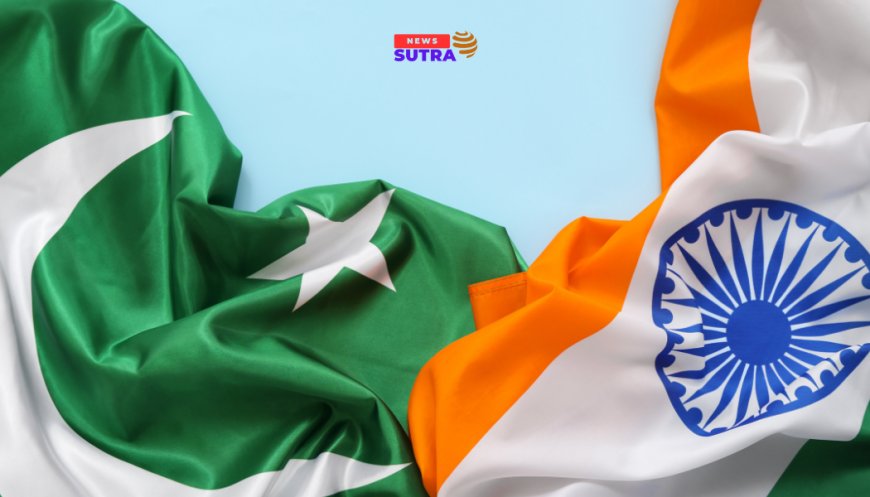India Draws a Hard Line: No Talks with Pakistan Beyond Terrorism and PoK
India has reiterated that any future talks with Pakistan will be limited to issues concerning cross-border terrorism and Pakistan-occupied Kashmir (PoK), signaling a firm and consistent diplomatic stance.

India has once again underscored its unwavering position regarding engagement with Pakistan. According to the Ministry of External Affairs (MEA), New Delhi will not consider resuming comprehensive bilateral talks unless they are centered strictly around cross-border terrorism and Pakistan-occupied Kashmir (PoK). This clear articulation comes amid recurring international pressure and Pakistan’s diplomatic outreach for dialogue.
The Indian government’s position has hardened over recent years, particularly following multiple terror attacks originating from Pakistan-based groups. The trust deficit between the two nuclear-armed neighbours remains deep, and India’s latest assertion is both a signal of strategic consistency and a message to the global community: dialogue is not diplomacy without accountability.
Historical Context: Dialogue Amid Distrust
India and Pakistan have engaged in multiple rounds of peace talks since their independence in 1947, with varying degrees of success. However, these engagements have often been derailed by terror attacks such as the 2001 Indian Parliament attack, the 2008 Mumbai attacks, and the 2016 Pathankot and Uri strikes.
These incidents, all linked to Pakistan-based terror outfits like Jaish-e-Mohammed and Lashkar-e-Taiba, have made it difficult for any Indian government to justify unconditional talks.
As explained by former Indian foreign secretary Shyam Saran in a policy paper by the Observer Research Foundation (ORF), "Engaging in dialogue while ignoring terrorism is akin to rewarding impunity."
The Firm Line: Terrorism and PoK Take Center Stage
In a recent weekly media briefing, MEA spokesperson Randhir Jaiswal reiterated India’s position, saying:
“India desires normal neighborly relations with Pakistan. However, the onus is on Pakistan to create an atmosphere free of terror and hostility.”
This sentiment was echoed in a statement made by Defence Minister Rajnath Singh, who firmly declared that Pakistan must vacate PoK, which is an integral part of India as per parliamentary resolutions.
India maintains that Pakistan-occupied Kashmir is under illegal occupation, and that any discussions must prioritize the restoration of sovereignty in that region.
This stance is grounded in the 1994 Indian Parliamentary Resolution, which asserts that the entire region of Jammu and Kashmir, including PoK, is an integral part of India.
Supporting Resource:
Global Reaction and Diplomatic Messaging
Internationally, India has been consistent in presenting its case before forums such as the United Nations, G20, and BRICS, making it clear that terrorism emanating from Pakistani soil remains a major obstacle to peace in South Asia.
India’s External Affairs Minister Dr. S. Jaishankar, in his address to the United Nations General Assembly (UNGA) in 2023, sharply stated:
“No nation can be expected to pursue dialogue when its citizens are under constant threat of cross-border terrorism.”
Read the full UNGA address by Dr. Jaishankar here.
The United States and the European Union have, in recent years, gradually acknowledged India's concerns about Pakistan’s support for extremist groups. The Financial Action Task Force (FATF) had even placed Pakistan on the grey list from 2018 to 2022 due to its failure to curb terror financing.
Pakistan’s Diplomatic Pushback
Islamabad continues to push for the resumption of a structured dialogue, especially concerning Kashmir, human rights, and water-sharing issues. However, Pakistan's track record of denying support to terror networks, even in the face of mounting global evidence, continues to hinder any significant breakthrough.
In a report by Al Jazeera, Pakistani officials claimed their intent for “peaceful resolution,” but India dismissed the offer as disingenuous, given the lack of action against militant groups active across the LoC.
Public Sentiment and Political Implications
The Indian public, especially after high-profile attacks like Pulwama in 2019, has shown strong support for a zero-tolerance policy on terrorism. The government's muscular stance has translated into political capital, particularly for the BJP-led NDA coalition.
Opposition parties, while generally supportive of national security objectives, have occasionally criticized the government for not exploring backchannel diplomacy. However, these criticisms often fall flat in the face of overwhelming public sentiment favoring security-first diplomacy.
Strategic Implications Going Forward
As India rises on the global stage — with growing influence in trade, technology, and defense — its diplomatic leverage also expands. With strategic partnerships with the United States, France, Australia, and Japan under frameworks like QUAD, India is under less pressure to entertain dialogues that do not align with its national security framework.
India’s position is not a diplomatic dead-end but a realignment of its priorities, ensuring that any future talks are based on verifiable actions rather than rhetorical assurances.
Additional Analysis:
Conclusion
India’s recalibrated approach to Pakistan is not just a reaction to past betrayals, but a strategic doctrine rooted in national security, territorial integrity, and public sentiment. By limiting talks to terrorism and PoK, New Delhi is setting non-negotiable benchmarks for engagement — ones that emphasize accountability over appeasement.
As global geopolitical dynamics shift and India continues to assert its role as a responsible power, its policy on Pakistan stands as a firm reminder: dialogue is welcome, but only when the foundations are built on trust, not terror.
















































